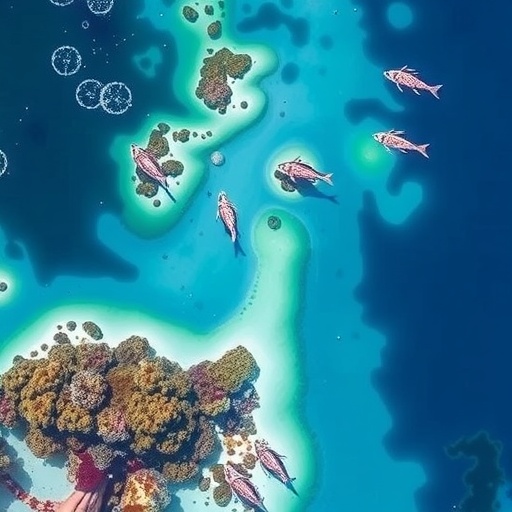In a sobering revelation about the ecological fate of coral reefs, recent findings published in the journal Coral Reefs confirm the dire impacts of anthropogenic climate change on marine ecosystems, particularly the Great Barrier Reef (GBR). The study, led by prominent researchers Emslie, Ceccarelli, and Logan, emphasizes that the disturbing trends observed during the unprecedented bleaching event of 2024 signal substantial coral loss along the northern stretches of this World Heritage site. This alarming trend not only threatens biodiversity but could also have profound implications for marine ecosystems and human communities that depend on them.
The Great Barrier Reef, renowned for its breathtaking marine biodiversity and complex ecosystem, faces existential threats linked directly to changes in global climate patterns. The research details how rising sea temperatures—exacerbated by human activities such as fossil fuel burning and deforestation—have led to mass coral bleaching events. In 2024, a large-scale bleaching incident demonstrated the particularly sensitive nature of these ecosystems to temperature fluctuations, underscoring the fragility of coral species amid increasing stressors from climate change.
During the 2024 bleaching event, researchers observed that certain coral species exhibited a ghastly loss of color as their symbiotic algae—zooxanthellae—departed in response to thermal stress. Without these algae, which provide up to 90% of the coral’s energy through photosynthesis, the corals are left vulnerable and unable to sustain their energy needs. The study identified regions of the GBR where coral mortality reached staggering levels, underscoring a global crisis that mirrors similar events observed in marine ecosystems across the globe.
The researchers employed extensive field surveys and remote sensing technology to assess which areas of the GBR were most affected. Notably, the northern section, often recognized for its biodiversity, faced overwhelming coral loss due to extreme heat. Their findings suggest that the patterns of mortality not only reflect the immediate impacts of bleaching but also hint at long-term shifts in community structure, with implications that could reverberate for generations.
The consequences of this coral loss extend beyond the reefs themselves. Coral ecosystems are fundamental to the health of our oceans, providing myriad services, from habitat for fish and marine organisms to coastal protection against storm surges. The study articulates the interconnectedness of coral reefs with human activities, emphasizing that local communities, particularly those reliant on fishing and tourism, face significant socio-economic challenges as these ecosystems collapse.
Moreover, these findings echo a broader scientific narrative about climate-related stressing factors affecting oceans worldwide. The study brings attention to the critical need for global climate action and conservation strategies that can more effectively shield these vulnerable ecosystems. While initiatives to curtail greenhouse gas emissions are essential, the researchers argue that local management strategies should also be enhanced to bolster coral resilience against climate-induced stressors.
In addressing these issues, the authors highlight the urgency of integrating scientific research into conservation practices. Local marine management strategies must be informed by the latest scientific understanding of ecosystem dynamics, particularly in the context of a warming world. Measures such as creating marine protected areas and enforcing sustainable fishing practices are presented as vital steps toward protecting remaining coral populations from further decline.
Public awareness and education also emerge as key themes in the discourse surrounding coral reef conservation. As the study illustrates, widespread public engagement is necessary to build a collective response to climate change and its consequences on marine life. The authors urge educational institutions, NGOs, and community organizations to collaborate on initiatives that inform and empower the public, fostering a sense of responsibility for these critical ecosystems.
Looking ahead, the research team calls for continued monitoring of coral habitats and long-term ecological studies to fully understand the implications of climate change on coral reefs. Such efforts could generate invaluable data to inform adaptive management strategies, ensuring that coral ecosystems continue to sustain both marine life and human communities in the face of ongoing climate challenges.
This research stands as a poignant reminder of the fragile state of our planet’s ecosystems and the pressing need for holistic approaches in addressing climate change. As humanity grapples with the unfolding consequences of its actions on nature, studies like this illuminate the path toward a more sustainable, resilient future for our oceans and the myriad species that inhabit them.
In conclusion, the findings presented by Emslie, Ceccarelli, and Logan serve as both a cautionary tale and a call to action. The substantial loss of coral on the northern Great Barrier Reef during the 2024 bleaching event underscores the urgent need for a united global response to the challenges posed by anthropogenic climate change. As we navigate the complexities of this ongoing crisis, it is imperative to embrace proactive measures to preserve our natural heritage for future generations.
Subject of Research: Impacts of anthropogenic climate change on coral reefs
Article Title: Anthropogenic climate change causes substantial loss of coral on the northern Great Barrier Reef during the 2024 bleaching event
Article References:
Emslie, M.J., Ceccarelli, D.M., Logan, M. et al. Anthropogenic climate change causes substantial loss of coral on the northern Great Barrier Reef during the 2024 bleaching event.
Coral Reefs (2025). https://doi.org/10.1007/s00338-025-02774-y
Image Credits: AI Generated
DOI: https://doi.org/10.1007/s00338-025-02774-y
Keywords: Coral reefs, climate change, bleaching event, biodiversity, environmental impact, marine ecosystems.




